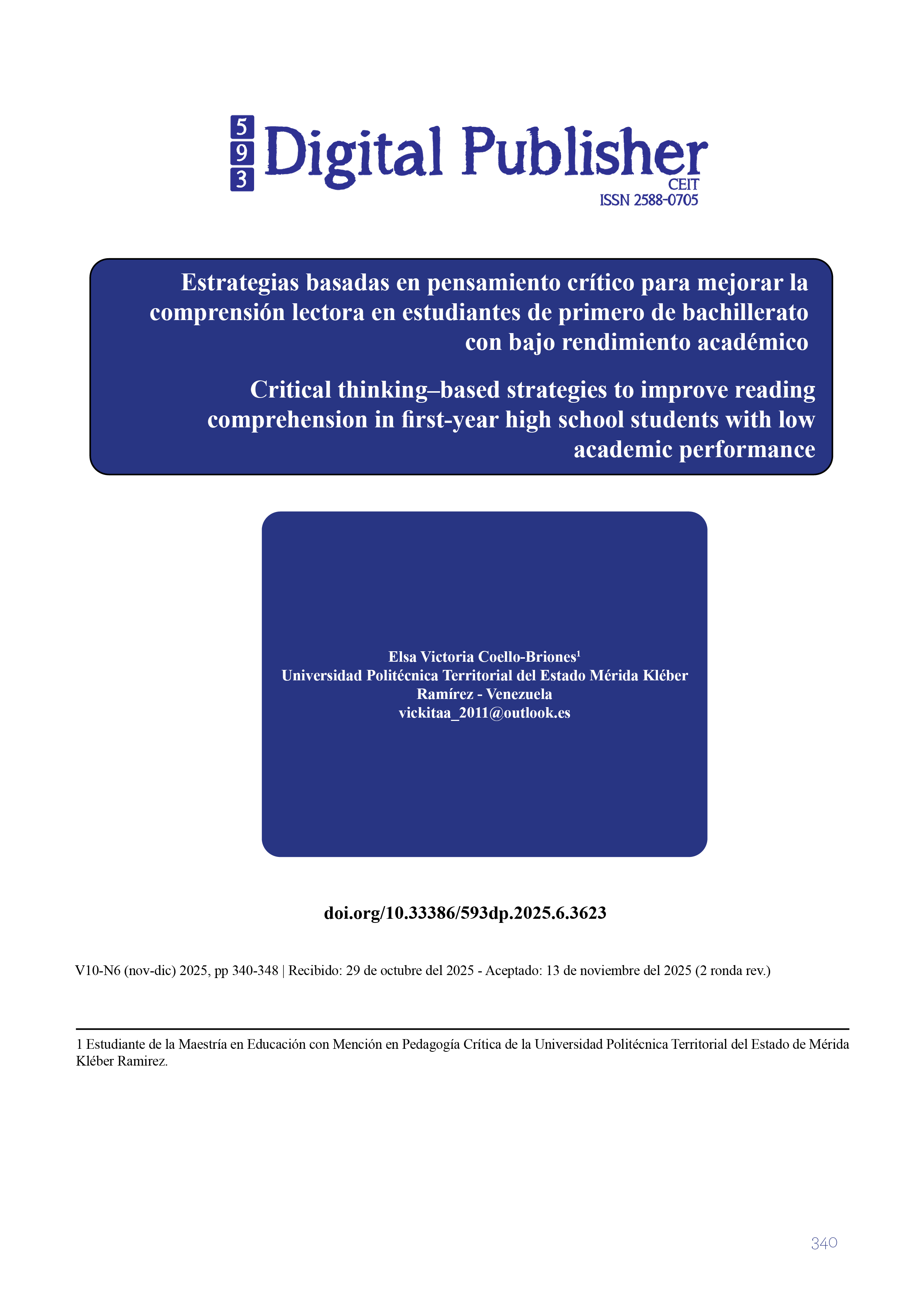Critical thinking–based strategies to improve reading comprehension in first-year high school students with low academic performance
Main Article Content
Abstract
This study examines the implementation of critical thinking–based pedagogical strategies to enhance reading comprehension and academic performance among first-year high school students. A qualitative, descriptive–documentary research design was adopted, drawing upon a systematic review of scholarly literature indexed in Scopus, Web of Science, and Scielo, complemented by classroom observations and teacher surveys in Language and Literature. Thematic analysis revealed recurrent patterns regarding effective practices, enabling factors, and constraints in the adoption of critical pedagogical approaches. Findings indicate that critical thinking strategies—such as debate, problem-solving, and reflective reading—foster analytical reasoning, intellectual autonomy, and active student engagement. Moreover, continuous teacher training and the use of contextually relevant teaching materials were identified as key determinants of successful implementation. The study concludes that integrating critical thinking into reading comprehension instruction not only improves academic performance but also promotes a more inclusive, reflective, and transformative education. Recommendations emphasize enhancing teacher professional development, fostering learning communities, and designing participatory environments that encourage dialogue, reflection, and collaboration.
Downloads
Article Details

This work is licensed under a Creative Commons Attribution-NonCommercial-ShareAlike 4.0 International License.
1. Derechos de autor
Las obras que se publican en 593 Digital Publisher CEIT están sujetas a los siguientes términos:
1.1. 593 Digital Publisher CEIT, conserva los derechos patrimoniales (copyright) de las obras publicadas, favorece y permite la reutilización de las mismas bajo la licencia Licencia Creative Commons 4.0 de Reconocimiento-NoComercial-CompartirIgual 4.0, por lo cual se pueden copiar, usar, difundir, transmitir y exponer públicamente, siempre que:
1.1.a. Se cite la autoría y fuente original de su publicación (revista, editorial, URL).
1.1.b. No se usen para fines comerciales u onerosos.
1.1.c. Se mencione la existencia y especificaciones de esta licencia de uso.
References
Ayre, M., Gómez, S., & Duarte, C. (2022). Qualitative rigor in community-based educational research. Educational Review, 74(6), 1123–1140. https://doi.org/10.1080/00131911.2022.2056439
Boysen, J. (2022). Critical pedagogy and early childhood education: Building agency through play and dialogue. Early Years, 42(4), 485–501. https://doi.org/10.1080/09575146.2021.1936217
Braun, V., & Clarke, V. (2022). Thematic analysis: A practical guide for researchers. Qualitative Research in Psychology, 19(3), 438–460. https://doi.org/10.1080/14780887.2020.1769238
Broom, L., & Leggett, P. (2022). Family engagement and student motivation in low-resource schools. Education and Urban Society, 54(8), 1012–1031. https://doi.org/10.1177/00131245211068241
Dwyer, C., Hogan, M., & Stewart, I. (2021). Developing critical thinking through argumentation. Educational Psychology Review, 33(1), 1–27. https://doi.org/10.1007/s10648-019-09495-6
Ennis, R. H. (2020). Critical thinking across the curriculum: A vision. Inquiry: Critical Thinking Across the Disciplines, 35(3), 1–10. https://doi.org/10.5840/inquiryct202035324
Facione, P. A. (2021). Critical thinking: What it is and why it counts (2021 update). Insight Assessment. https://www.insightassessment.com
González, F., López, M., & Salazar, C. (2023). Teaching strategies for reading comprehension in Latin American schools. Journal of Educational Studies, 65(2), 211–230. https://doi.org/10.1080/03055698.2023.2204157
Greenland, S. (2022). Educational inquiry and interpretive design in complex contexts. International Journal of Educational Research Open, 15, 100214. https://doi.org/10.1016/j.ijedro.2022.100214
Kuhn, D., & Dean, D. (2022). Metacognition and reasoning development in adolescence. Learning and Instruction, 80, 101613. https://doi.org/10.1016/j.learninstruc.2021.101613
Kumar, D., Al-Zoubi, S., & Torres, P. (2024). Community participation and educational quality in rural schools: Evidence from developing contexts. Educational Studies, 60(2), 187–205. https://doi.org/10.1080/03055698.2023.2211452
López, M., & González, L. (2021). Challenges of reading comprehension in Latin American secondary education. Revista Educación y Desarrollo, 19(4), 45–61. https://doi.org/10.22201/fedu.2007157x20211945
Manrique, V., Paredes, M., & Silva, L. (2023). La corresponsabilidad familiar y su incidencia en el rendimiento escolar rural. Revista Latinoamericana de Educación Inclusiva, 17(2), 45–64. https://doi.org/10.4067/S0718-73782023000200045
Maruyama, K., Rivera, J., & Darder, A. (2023). Culturally responsive pedagogy and participatory learning environments. Learning, Culture and Social Interaction, 38, 100669. https://doi.org/10.1016/j.lcsi.2023.100669
Nowell, L., Norris, J., White, D., & Moules, N. (2024). Thematic analysis: Advancing trustworthiness in qualitative studies. International Journal of Qualitative Methods, 23, 16094069231108224. https://doi.org/10.1177/16094069231108224
Rivera, A. (2022). Gestión escolar y participación comunitaria en contextos rurales de América Latina. Revista Educación y Desarrollo Social, 16(3), 55–74. https://doi.org/10.18359/reds.6105
Snow, C. E. (2022). Reading for understanding: Toward a research and development program in reading comprehension (Updated ed.). RAND Corporation. https://www.rand.org
Tenny, S., & Brannan, G. (2022). Exploring qualitative inquiry in educational contexts. Education and Urban Society, 54(8), 987–1002. https://doi.org/10.1177/00131245211068240
UNESCO. (2023). Informe sobre el estado de la educación en América Latina y el Caribe 2023. UNESCO. https://unesdoc.unesco.org
Wan, C., Li, T., & Zhou, Y. (2021). Play-based learning and critical thinking development in early childhood classrooms: A systematic review. Journal of Early Childhood Research, 19(3), 263–279. https://doi.org/10.1177/1476718X20985467


